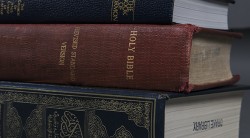This past August in Milwaukee, Wis., the crowd in a Sikh temple had recently finished its ritual prayer and had begun to prepare its customary meal. That’s when Wade Michael Page, a 40-year-old ex-Army soldier, allegedly came through the doors of the temple and opened fire. The shooter, a man with ties to a neo-Nazi organization, killed six people he did not know, who practiced a religion he did not understand.
“This man who enjoyed music, who was a member of a white supremacist-affiliated rock band, could not hear the universal melody of peace that is at the core of the Sikh faith,” Nikky-Guninder Kaur Singh, professor of religion at Colby College, told members of the Drake University community this month. She delivered her lecture, “Sikhism and Suffering: Understanding and Healing after the Milwaukee Massacre,” as part of The Comparison Project.
Timothy Knepper, associate professor of philosophy at Drake and director of The Comparison Project, believes it’s time for humanity to face the music—to learn and appreciate the similarities and differences between our religious faiths and to abandon discordant notes of ignorance, misunderstanding, and hatred.
The Comparison Project, an initiative Knepper launched this year, features a series of lectures, panel discussions, and interfaith dialogues designed to spark religiously diverse conversations and promote religious and cultural understanding. The program is an illustration of Drake’s commitment to the intellectual and moral development of its students and the emphasis on building a campus community where differences are embraced.
“If we want to live together, we need to understand one another,” Knepper says. “I think it is impossible to love the neighbor whom you don’t understand. And it is impossible to understand the neighbor whom you assume to be wrong simply because they don’t share your faith.”
Events this year will focus on the theme of religious responses to suffering, one of the most universal human experiences. The schedule includes presentations on Islam, Judaism, Buddhism, Christianity, and the faith of the Lakota, an indigenous people of the Great Plains, as well as an interfaith dialogue between members of many of these religions.
Singh, who was the first speaker on The Comparison Project’s calendar, says she thinks the initiative can go far to promote tolerance and cooperation in a world where religion often plays critical roles in political discussions, economic considerations, and the social sphere.
“It is imperative that we learn not to discriminate because of differences in the colors of our eyes, the textures of our clothing, the complexion of our skin, the color of our hair, or the nature of our beliefs,” Singh told the crowd of about 50 students and community members at Drake. “That is why I am very grateful to [Knepper] and to Drake for this vision to bring people of different faiths together.”
Jesse Wright, a junior advertising major from Des Moines, attended Singh’s lecture. He says it energized him to attend other events organized by The Comparison Project.
“I like to read about all kinds of religions, and as far as Christianity is concerned I’ve been to a few different churches,” Wright says. “But in Iowa it’s hard to learn about things like Islam, Hinduism, and Sikhism. [The Comparison Project] gives me first-hand exposure to these unfamiliar faiths.”
Learn more about The Comparison Project by visiting its website, Facebook page, and Twitter feed.
-By Aaron Jaco, JO’07, AS’07


